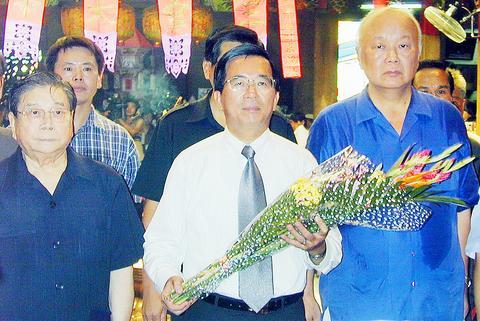Speaking hours after the slaughter of the controversial "President Pig," President Chen Shui-bian (陳水扁) said yesterday the practise of sacrificing "divine pigs" has been taking place for more than 170 years and must be respected as a part of Hakka culture.
"As a part of Hakka culture, it [sacrificing divine pigs] cannot be vilified, distorted or insulted by any individual or group," Chen said at the Hakka Yimin Cultural Festival in Hsinchu yesterday afternoon.

PHOTO: LIANG HSIU-HSIEN, TAIPEI TIMES
Chen's comments came in response to recent controversy sparked by animal-rights groups who blasted divine pig contests, for which pigs are forcibly fattened up before being sacrificed in a special ceremony.
At the center of the storm was the so-called President Pig supposedly sponsored by the president while on a trip to Hsinpu, Hsinchu County, last year.
The outcry, however, came too late to save the 720kg animal, which, following a week of uncertainty over its future, was eventually slaughtered at the Yimin festival yesterday morning.
Addressing the festival, Chen said that people still have to respect Hakka customs no matter their personal view of the president.
"People can oppose what I say and what I do. But that opposition cannot spill over against Hakka culture and customs," Chen said.
Chen supposedly made a vow to the Yimin god three years ago that he would sacrifice a divine pig if he was elected president, according to DPP Hsinchu chapter director Lin Wei-chou (林為洲).
In a bid to placate animal-rights activists, Chen instead sacrificed a pig made of rice, Lin said.
The President Pig was killed as scheduled in the name of "Chen Shui-bian and resident believers."
The pig failed to win the divine-pig competition, which picks out the biggest pig for an offering during the Yimin festival.

TRAFFIC SAFETY RULES: A positive result in a drug test would result in a two-year license suspension for the driver and vehicle, and a fine of up to NT$180,000 The Ministry of Transportation and Communications is to authorize police to conduct roadside saliva tests by the end of the year to deter people from driving while under the influence of narcotics, it said yesterday. The ministry last month unveiled a draft of amended regulations governing traffic safety rules and penalties, which included provisions empowering police to conduct mandatory saliva tests on drivers. While currently rules authorize police to use oral fluid testing kits for signs of drug use, they do not establish penalties for noncompliance or operating procedures for officers to follow, the ministry said. The proposed changes to the regulations require

The Executive Yuan yesterday announced that registration for a one-time universal NT$10,000 cash handout to help people in Taiwan survive US tariffs and inflation would start on Nov. 5, with payouts available as early as Nov. 12. Who is eligible for the handout? Registered Taiwanese nationals are eligible, including those born in Taiwan before April 30 next year with a birth certificate. Non-registered nationals with residence permits, foreign permanent residents and foreign spouses of Taiwanese citizens with residence permits also qualify for the handouts. For people who meet the eligibility requirements, but passed away between yesterday and April 30 next year, surviving family members

China Airlines Ltd (CAL) yesterday morning joined SkyTeam’s Aviation Challenge for the fourth time, operating a demonstration flight for “net zero carbon emissions” from Taiwan Taoyuan International Airport to Bangkok. The flight used sustainable aviation fuel (SAF) at a ratio of up to 40 percent, the highest proportion CAL has achieved to date, the nation’s largest carrier said. Since April, SAF has become available to Taiwanese international carriers at Taipei International Airport (Songshan airport), Kaohsiung International Airport and Taoyuan airport. In previous challenges, CAL operated “net zero carbon emission flights” to Singapore and Japan. At a ceremony at Taoyuan airport, China Airlines chief sustainability

‘ONE CHINA’: A statement that Berlin decides its own China policy did not seem to sit well with Beijing, which offered only one meeting with the German official German Minister for Foreign Affairs Johann Wadephul’s trip to China has been canceled, a spokesperson for his ministry said yesterday, amid rising tensions between the two nations, including over Taiwan. Wadephul had planned to address Chinese curbs on rare earths during his visit, but his comments about Berlin deciding on the “design” of its “one China” policy ahead of the trip appear to have rankled China. Asked about Wadephul’s comments, Chinese Ministry of Foreign Affairs spokesman Guo Jiakun (郭嘉昆) said the “one China principle” has “no room for any self-definition.” In the interview published on Thursday, Wadephul said he would urge China to